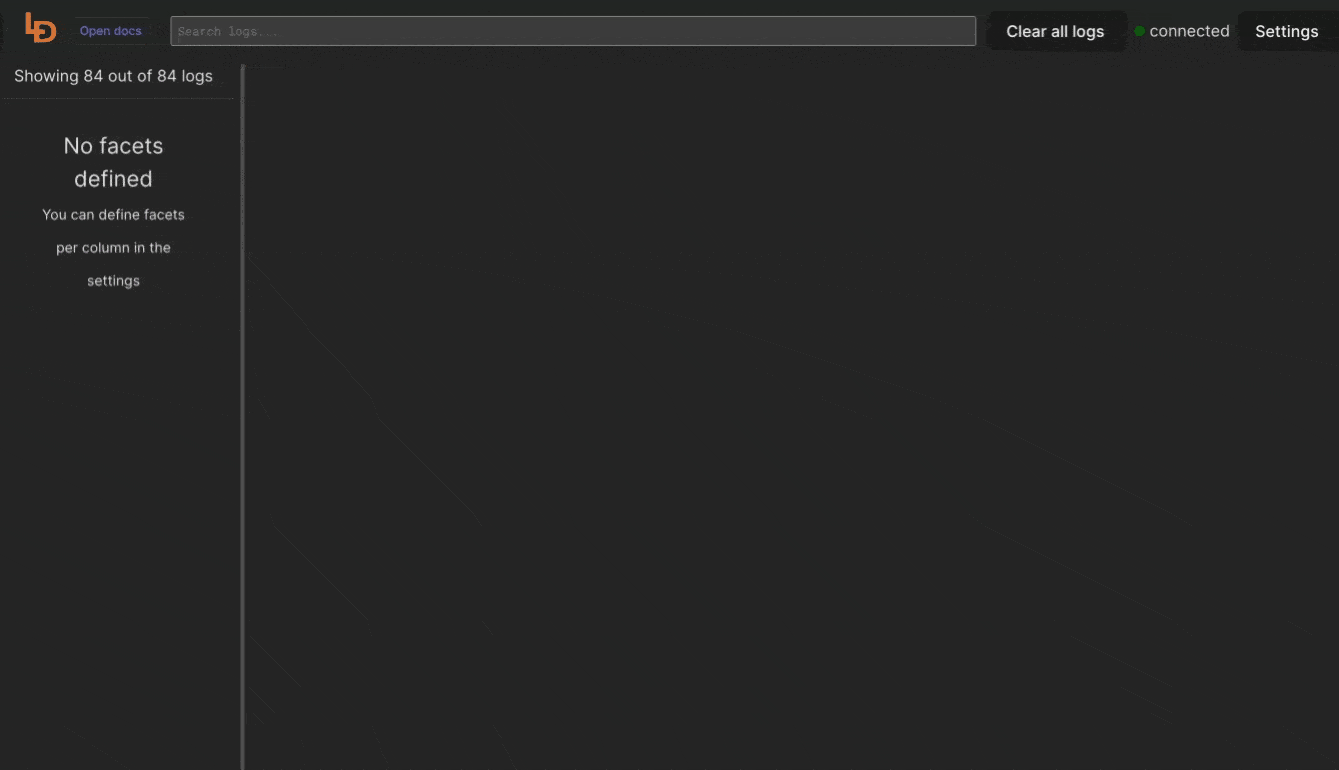https://github.com/logdyhq/logdy-core
Realtime log viewer with web UI, tail -f for logs with a web interface browser.
https://github.com/logdyhq/logdy-core
developer-experience developer-productivity golang-logger log log-viewer logger logging logging-library logging-server logs logs-view logviewer self-hosted selfhosted
Last synced: 7 months ago
JSON representation
Realtime log viewer with web UI, tail -f for logs with a web interface browser.
- Host: GitHub
- URL: https://github.com/logdyhq/logdy-core
- Owner: logdyhq
- License: apache-2.0
- Created: 2024-01-24T23:12:45.000Z (almost 2 years ago)
- Default Branch: main
- Last Pushed: 2025-03-06T07:48:40.000Z (9 months ago)
- Last Synced: 2025-05-14T16:02:45.882Z (7 months ago)
- Topics: developer-experience, developer-productivity, golang-logger, log, log-viewer, logger, logging, logging-library, logging-server, logs, logs-view, logviewer, self-hosted, selfhosted
- Language: Go
- Homepage: https://logdy.dev
- Size: 35.3 MB
- Stars: 1,547
- Watchers: 6
- Forks: 37
- Open Issues: 19
-
Metadata Files:
- Readme: README.md
- License: LICENSE
Awesome Lists containing this project
- awesome-observability - logdy - Supercharge terminal logs with web browser UI and low-code. It's like jq, tail, less, grep and awk merged together and available in a clean UI. Self-hosted, single binary. (6. Collector / Logging)
- awesome-json - logdy - jq, tail, less, grep and awk merged together and available in a clean web UI. (Command-line tools)
- awesomeLibrary - logdy-core - Web based real-time log viewer. Stream ANY content to a web UI with autogenerated filters. Parse any format with TypeScript. (语言资源库 / go)
- my-awesome-list - logdy-core - f for logs with a web interface browser. | logdyhq | 2001 | (Go)
- awesome-cli-apps - logdy - Supercharge terminal logs with web UI. (Development / Devops)
- fucking-awesome-cli-apps - logdy - Supercharge terminal logs with web UI. (Development / Devops)
- my-awesome - logdyhq/logdy-core - experience,developer-productivity,golang-logger,log,log-viewer,logger,logging,logging-library,logging-server,logs,logs-view,logviewer,self-hosted,selfhosted pushed_at:2025-08 star:2.0k fork:0.1k Realtime log viewer with web UI, tail -f for logs with a web interface browser. (Go)
README
# Logdy - terminal logs in web browser

Webpage |
Demo |
Docs |
Download |
Blog |

### Latest version: 0.16.0 (6 March 2024) - [Read announcement](https://logdy.dev/blog/post/logdy-new-version-announcement-v016)
Logdy is a lightweight, single-binary log viewer that works just like `grep`, `awk`, `sed`, or `jq`. Simply add it to your PATH—no installation, deployment, or compilation required. It runs entirely locally, ensuring security and privacy. [Read more](https://logdy.dev/docs/what-is-logdy).
### Key features
* Zero-dependency single binary
* Embedded Web UI
* Real-time log viewing and filtering
* Secure local operation
* Multiple input modes (files, stdin, sockets, REST API)
* Custom parsers and columns with TypeScript support (code editor with types support)
* Go library integration
### Standalone use
```bash
# Use with any shell command
$ tail -f file.log | logdy
WebUI started, visit http://localhost:8080
# Read log files
$ logdy follow app-out.log --full-read
WebUI started, visit http://localhost:8080
```
More use [modes in the docs.](https://logdy.dev/docs/explanation/command-modes)
### Use as a Go library
```go
package main
import "github.com/logdyhq/logdy-core/logdy"
func main(){
logdyLogger := logdy.InitializeLogdy(logdy.Config{
ServerIp: "127.0.0.1",
ServerPort: "8080",
}, nil)
// app code...
logdyLogger.LogString("This is a message")
logdyLogger.Log(logdy.Fields{"msg": "supports structured logs too", "url": "some url here"})
}
```
Check [docs](https://logdy.dev/docs/golang-logs-viewer) or [example app](https://github.com/logdyhq/logdy-core/blob/main/example-app/main.go).
## Demo of the UI
Visit [demo.logdy.dev](https://demo.logdy.dev)

Visit [logdy.dev](http://logdy.dev) for more info and detailed documentation.
##### Project status: New features added actively.
Logdy is in active development, with new features being added regularly. Feedback is welcome from early adopters. Feel free to post [Issues](https://github.com/logdyhq/logdy-core/issues), [Pull Requests](https://github.com/logdyhq/logdy-core/pulls) and contribute in the [Discussions](https://github.com/logdyhq/logdy-core/discussions). Stay tuned for updates, visit [Logdy Blog](https://logdy.dev/blog).
## Install using script
The command below will download the latest release and add the executable to your system's PATH. You can also use it to update Logdy.
```bash
curl https://logdy.dev/install.sh | sh
```
## Install with Homebrew (MacOS)
On MacOS you can use homebrew to install Logdy.
```bash
brew install logdy
```
## Download precompiled binary
Navigate to [releases](https://github.com/logdyhq/logdy-core/releases) Github page and download the latest release for your architecture.
```bash
wget https://github.com/logdyhq/logdy-core/releases/download/v0.16.0/logdy_linux_amd64;
mv logdy_linux_amd64 logdy;
chmod +x logdy;
```
Additionally, you can [add the binary to your PATH](https://logdy.dev/docs/how-tos#how-to-add-logdy-to-path) for easier access.
## Quick start
Whatever the below command will produce to the output, will be forwarded to a Web UI.
```bash
node index.js | logdy
```
The following should appear
```
INFO[2024-02...] WebUI started, visit http://localhost:8080 port=8080
```
Open the URL Address and start building parsers, columns and filters.
There are multiple other ways you can run Logdy, check the [docs](https://logdy.dev/docs/explanation/command-modes).
## Install Go library
```bash
go get -u github.com/logdyhq/logdy-core/logdy
```
[Read more](https://logdy.dev/docs/golang-logs-viewer) about how to use Logdy embedded into your Go app.
## Documentation
For product documentation navigate to the [official docs](https://logdy.dev/docs/quick-start).
## CLI Usage
```bash
Usage:
logdy [command] [flags]
logdy [command]
Available Commands:
completion Generate the autocompletion script for the specified shell
demo Starts a demo mode, random logs will be produced, the [number] defines a number of messages produced per second
follow Follows lines added to files. Example `logdy follow foo.log /var/log/bar.log`
forward Forwards the STDIN to a specified port, example `tail -f file.log | logdy forward 8123`
help Help about any command
socket Sets up a port to listen on for incoming log messages. Example `logdy socket 8233`. You can setup multiple ports `logdy socket 8123 8124 8125`
stdin Listens to STDOUT/STDERR of a provided command. Example `logdy stdin "npm run dev"`
utils A set of utility commands that help working with large files
Flags:
--api-key string API key (send as a header Authorization)
--append-to-file string Path to a file where message logs will be appended, the file will be created if it doesn't exist
--append-to-file-raw When 'append-to-file' is set, raw lines without metadata will be saved to a file
--bulk-window int A time window during which log messages are gathered and send in a bulk to a client. Decreasing this window will improve the 'real-time' feeling of messages presented on the screen but could decrease UI performance (default 100)
--config string Path to a file where a config (json) for the UI is located
--disable-ansi-code-stripping Use this flag to disable Logdy from stripping ANSI sequence codes
-t, --fallthrough Will fallthrough all of the stdin received to the terminal as is (will display incoming messages)
-h, --help help for logdy
--max-message-count int Max number of messages that will be stored in a buffer for further retrieval. On buffer overflow, oldest messages will be removed. (default 100000)
-n, --no-analytics Opt-out from sending anonymous analytical data that helps improve Logdy
-u, --no-updates Opt-out from checking updates on program startup
-p, --port string Port on which the Web UI will be served (default "8080")
--ui-ip string Bind Web UI server to a specific IP address (default "127.0.0.1")
--ui-pass string Password that will be used to authenticate in the UI
-v, --verbose Verbose logs
--version version for logdy
```
**It is possible to also provide some of the options as ENV variables, read more in the docs**
## Development
For development, we recommend running `demo` mode
```bash
go run . demo 1
```
The above command will start Logdy in `demo` mode with 1 log message produced per second.
You can read more about [demo mode](https://logdy.dev/docs/demo-mode).
If you would like to develop with UI, check [readme for logdy-ui](https://github.com/logdyhq/logdy-ui) for instructions how to run both together during development.
## Building
This repository uses static asset embedding during compilation. This way, the UI is served from a single binary. Before you build make sure you copy a compiled [UI](https://github.com/logdyhq/logdy-ui) (follow the instructions about building) in `http/assets` directory. The UI is already commited to this repository, so you don't have to do anymore actions.
Look at `http/embed.go` for more details on how UI is embedded into the binary.
For a local architecture build:
```bash
go build
```
## Releasing
For a cross architecture build use `gox`. This will generate multiple binaries (in `bin/` dir) for specific architectures, don't forget to update `main.Version` tag.
```bash
gox \
-ldflags "-X 'main.Version=x.x.x'" \
-output="bin/{{.Dir}}_{{.OS}}_{{.Arch}}" \
-osarch="linux/amd64 windows/386 windows/amd64 darwin/amd64 darwin/arm64 linux/arm64"
```
Once it's ready, publish the binaries in a new Github release. Again, don't forget to update the version.
```bash
ghr vx.x.x bin/
```